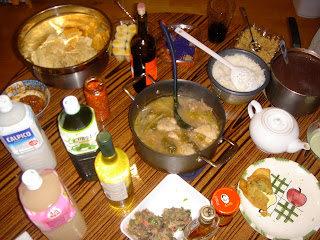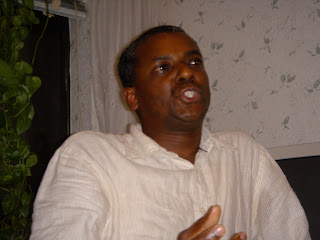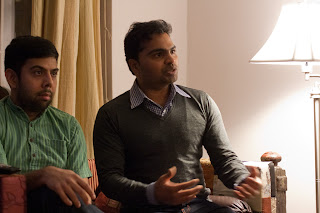
November's Chili Salon took us to Woodside, Queens, to the home of Jill Aguado and Rona Luo. Amid dal, Filipino stew, chili hot chocolate and other delicacies from the neighborhood, chili veterans and new friends gathered to hear stories and exchange debate.
First up was Gail Dottin, non-fiction writer from Jamaica, Queens. Gail's piece titled, 'Stick to your ribs, the politics of reason' satirized the immense burden of the stereotypes associated with being black in the US. “The first thing you should know is that I am black” she began. She recalled stories of childhood memories in Jamaica (Queens), trips to Tony Roma's, life at Sarah Lawrence, block parties in Brooklyn and Meet-the-Parents episodes with her white girlfriend. Through the visceral act of eating fried chicken, Gail took us through the stereotypes, the shame and the complicated politics of eating fried chicken, depending on who was in the room.

Sometimes, she said, she would just order the cheeseburger, to save being a potential spectacle. The provocative reading followed a discussion, in which Gail shared how she developed the piece, from the high streets at Columbia University to the safe spaces of Audre Lorde Project in Fort Greene.
Next up was Roy Sirengo, an environmental artist, whose work attempts to bridge the distance between the arts and science. The topic of the evening was the proposed Marcellus Shale drilling in upstate New York. Roy presented excerpts from the NYC public hearing that highlighted environmental concerns and projected economic benefits related to the drilling. Having heard a balanced presentation of both sides of the debate, the audience engaged in a lively Q & A session, where every participant was invited to express their opinions.
Rona's comment spoke to the heart of the dilemma. She spoke about her grandmother in rural China who died of cold weather during a blizzard resulting from a regional power outage. On a more recent visit, she welcomed the indoor heating in rural homes, made possible by natural gas, but wondered about the environmental costs. She said that it is important to remember that people die without access to this resource.

Lively comments followed: Why is it that demand and lifestyle are rarely questioned? Most people felt that the only way to reverse demand is through force, which cannot be easily done in a democracy. The question of subsidies for petroleum was raised, to which a tax attorney in the audience pointed out that all forms of energy are subsidized in some form and that there has never been a non-subsidized energy source. Anouska shared information about how the City of Austin's proposed smart grid. She offered insight into why resources are often not invested to support innovation.
We all agreed that this is just the beginning of learning more about this issue.
 The first Chili Salon of 2010 kicked off with a trio of artists representing different media. But by the end of the night, a common thread emerged in each artist's layered approach to his or her work. It was as layered as the food offerings of the evening, spicy nuts to cranberry-cheese-bread (a soft piece of heaven from a Colombian bakery nearby). First came the appetizers - samosa and pakoras, chips and cheese.
The first Chili Salon of 2010 kicked off with a trio of artists representing different media. But by the end of the night, a common thread emerged in each artist's layered approach to his or her work. It was as layered as the food offerings of the evening, spicy nuts to cranberry-cheese-bread (a soft piece of heaven from a Colombian bakery nearby). First came the appetizers - samosa and pakoras, chips and cheese.  showed their avant garde film "Blink," a narrative constructed from short vignettes demonstrating life, death and what lies in between.
showed their avant garde film "Blink," a narrative constructed from short vignettes demonstrating life, death and what lies in between.
